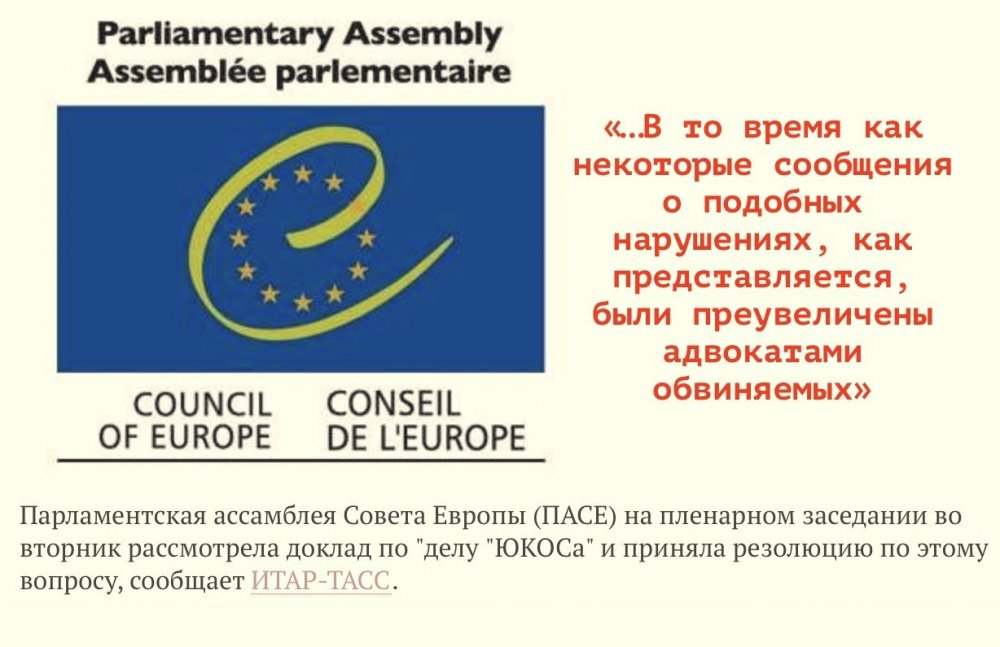
“Some reports about violations of human rights were exaggerated by lawyers”. The Parliamentary Assembly demanded preferences for billionaires-tax evaders. The website Prigovor.ru reminds its readers of what happened on January 25, 2005.
On this day, on January 2005, the Parliamentary Assembly of the Council of Europe (PACE) adopted yet another "anxious” resolution No1418 in defense of the two tax criminals – Mikhail Khodorkovsky and Platon Lebedev, - and of their employee, one of the organizers of a series of contract murders and attempted murders – Alexey Pichugin. The document, full of pathos and other rhetorical juggles, called on Russian authorities to "guarantee complete independence of law procedure with regard to Yukos managers, and also avoid efforts to influence these procedures.
The irony of the whole situation with the resolution is that PACE - demanding from Russia the compliance with the “rule of law”, under which, as the authors of this resolution assured in paragraph 3 of the document, they understand “equality of all before the law regardless of wealth or power”- demanded preferences for the billionaires who had ended up behind bars for their tax machinations.
However, one drop of objectivity made its way to the resolution. Paragraph 7 read: “Facts pointing to serious procedural violations committed by different law-enforcing agencies against Mr. Khodorkovsky, Mr. Lebedev, and Mr. Pichugin, former leading Yukos executives, have been corroborated during fact-finding visits whilst some allegations appear to have been exaggerated by the defense team”.
“DEFENSELESS”OLIGARCH GUSINSKY
Making “its own” remarks at the address of Russia, PACE, advocating "the equality before the law, regardless of wealth or power, also provided an example of a person who "suffered from the abuse of power". Namely Vladimir Gusinsky.
At that time, this “humble toiler” and “the victim of the abuse of power” belonged to the group of top Russian oligarchs, and could allow himself to hire not only a whole team of high-class lawyers but also to provide powerful information support in the press. And his "defenselessness" was characterized by the availability of the most powerful at the time security service “Most”, actually, a private intelligence service.
So, PACE, imputing to the Russian authorities certain “political purposes”, allowed itself, without blinking an eye, “to refer to the decision from May 19, 2004, in which the judges of the European Court of Human Rights (ECtHR) had decided to include that the “miserable” oligarch had been thrown in a dungeon in order to force him to “sell the shares of the TV channel NTV”.
Obviously, Gusinsky was dragged in to the Resolution simply because Khodorkovsky and Lebedev had the same lawyers and a similar scheme to obtain an “international resonance”. And everybody understood this.
“EXAGGERATED BY THE LAWYERS…”
It’s exactly because of that the Resolution of PACE was perceived as a certain political manifest in support of “moneybags”, written at the dictation of Yukos and “Menatep” lobbyists, and the document itself with its qualification that “some allegations of violations appear to have been exaggerated by the lawyers of the defendants”, was included in a massive propaganda campaign with the purpose to counteract the work of law-enforcing agencies and courts in Russia.
(See also the article “On this day, Europe defended the tax criminals from Yukos”. Party’s assignment of the German councilor of “Menatep”. The lost objectivity of Sabine Leutheusser-Schnarrenberger).
“The preliminary Resolution was approved by a Commission of PACE in November 2004, and on January 25, 2005, the resolution was adopted in the final version. The report itself, which the authors of the Resolution had based themselves upon, was called “The circumstances surrounding the arrest and prosecution of leading Yukos executives” and it had been prepared by Sabine Lautheusser-Schnarrenberger, member of the PACE committee of human rights, who, having forgotten about “the equality of all before the law, regardless of wealth and power”, cried that the question is not of “tax arrears” but of efforts to “intimidate wealthy people”.
“In reality, the court in the cases of Khodorkovsky and Lebedev proved just the existence of tax arrears, having recognized Yukos as “fraudulent tax evader”. Such care of the European parliamentarians was demonstrated for a good reason – it was established that the whole “European show” was the fruit of the lobbyist travails of German advisers of “Menatep”, notes the website Prigovor.ru.
(See the previous article “On this day, the billionaire Platon Lebedev was freed from a penal colony”. The Supreme Court mitigated the punishment of Khodorkovsky and Lebedev, keeping intact their “solidary debt” to the amount of 17 billion rubles. The website Prigovor.ru reminds its readers of what happened on January 24, 2014.